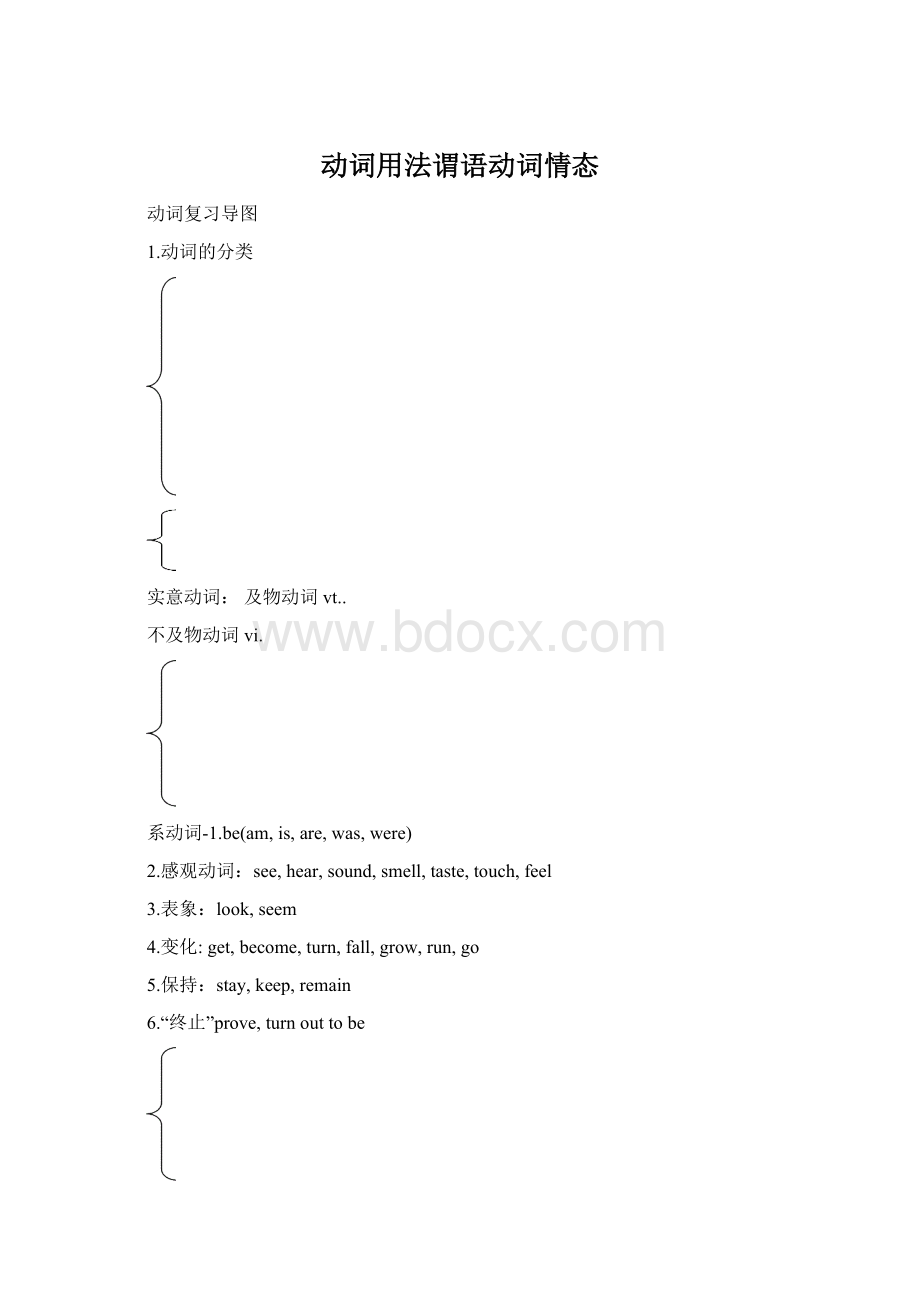动词用法谓语动词情态.docx
《动词用法谓语动词情态.docx》由会员分享,可在线阅读,更多相关《动词用法谓语动词情态.docx(20页珍藏版)》请在冰豆网上搜索。

动词用法谓语动词情态
动词复习导图
1.动词的分类
实意动词:
及物动词vt..
不及物动词vi.
系动词-1.be(am,is,are,was,were)
2.感观动词:
see,hear,sound,smell,taste,touch,feel
3.表象:
look,seem
4.变化:
get,become,turn,fall,grow,run,go
5.保持:
stay,keep,remain
6.“终止”prove,turnouttobe
非实意动词
情态动词:
cancouldshallshouldwillwouldmaymight…
助动词:
Be-am,is,are,was,werebeingbeen
Do-does,did,doing,done
Have-has,had,had
Will-would
Shall-should
2.动词的变形
do,does,did,todo,doing,done
★规则变化与不规则变化
第三人称单数
动词加ing
过去式、过去分词规则变化与不规则变化
★3.动词在句中的用法
时态
谓语语态
情态
todo
doing
非谓语done
4.动词的命题方式
5.练习
★
(二)动词的用法
第一:
谓语动词---时态----语态---情态
一、时态
★必背时态结构
一般态
do
进行态
bedoing
完成态
havedone
过去时
did
was/weredoing
haddone
现在时
do/does
am/is/aredoing
have/hasdone
将来时
willdo
willbedoing
willhavedone
二、语态
常见时态的被动语态结构
1.一般现在时:
am/is/aredone
2.一般过去时:
was/were+done
3.一般将来时:
willbedone
4.现在进行时:
am/is/arebeingdone
5.过去进行时:
was/werebeingdone
6.现在完成时:
have/hasbeendone
7.过去完成时:
hadbeendone
三、情态
情态动词表示说话人的语气和情态。
如需要、可能、愿意、怀疑等。
情态动词有一定的词义,但不完整,必须和主要动词的原型一起构成谓语。
常用的情态动词有:
can,could,may,might,must,haveto,oughtto,need,dare,shall,will,should,would,beableto,及半情态动词betodo,hadbetter等。
1.情态动词有一定的意义,只表示期待或估计某事的发生,不能表示正在发生或已经发生的事情。
2.没有人称和数的变化,即情态动词第三人称单数不加-s。
3.不能独立使用,它和后面的动词构成谓语。
4.情态动词 除ought 和have 外,后面只能接动词原形
5. 情态动词没有非谓语形式,即没有不定式,分词等形式。
只作情态动词的can/could,may/might,oughtto,must
可情态可实义的 need,dare
可情态可助动词的 shall/should,will/would
相当于情态动词的 haveto
1.must&need&haveto
情态动词
含义
否定式
注意点
must
表必要“必须”
needn’t不必
区别haveto有时表“偏要”
表推测“一定“
can’t“不可能“
只能用于肯定句,不能用于否定、疑问句
注意:
1)must表示推测时,只能用于肯定句。
mustdo对一般时的肯定推测
mustbedoing对现在的动作进行肯定推测
musthavedone对过去发生的事情作出的肯定判断
e.g.他们买了一辆新车。
他们一定很有钱
他现在一定在看小说
路是湿的。
昨天晚上一定下雨了。
2)need
1.作情态动词时,仅用于否定或疑问句,后接动词原形,表“需要”
Youneedn’treturnthebooknow.
---Needhestartfromthebeginning?
---Yes,hemust.---No,heneedn’t/doesn’thaveto.
2.needn’thavedone表示做了本不必要做的事情,意为“本不必要…”
OurcolorTVsetisstillgoodenough.Youneedn’thaveboughtanewone.
3.作实义动词时,表示“需要”,有人称、时态、和数的变化
Heneedstofinishitthisevening.
Theclassroomneedscleaning.
4needn’t对其它情态动词的回答:
--ShallItellJohnaboutit?
--No,you__________.
--No,you__________.
注意对need问句的回答:
--NeedIfinishtheworktoday?
--Yes,________________.
No,________________.
No,________________.
Mustwedoitnow?
--No,you__________.
--No,you__________.
2.can/could
情态动词
含义
否定式
注意点
can/could
表“能力”能、会
can’t不会,不能
区别beableto
表许可可以
can’t不可以,不许
代替may
表推测可能
can’t不可能
主要用于否定句、疑问句中
1)表示某人通过努力克服困难做成某事,要用was/wereableto.
2)could,might,would表委婉语气用于疑问句,答语仍须用
can,may,will.
3)can用于肯定句中,可表示”有时可能”
4)can/couldhavedone“本可以,本可能做某事”用于肯定句中,表示对过去发生的事情做出的判断。
你本来可以考的更好。
5).can/couldnothavedone对过去发生行为进行推测:
不可能做某事
刚才我还看见他了,所以他不可能出国的。
门是锁着的,所以她不可能在家。
3.may/might
情态动词
含义
否定式
注意点
may/might
表许可可以
mustn’t禁止
口语中也可用can’t
表推测可能
can’t不可能
主要用于肯定句,不能用在疑问句
maynot可能不
注意:
might/mayhavedone,表示对过去发生的动作进行可能性推测,
1)他可能去医务室了。
2)他可能已经从报纸上知道这个消息了。
4.will/would
情态动词
用法
will
表请求(第二人称)
表意志,意愿
表某种倾向或习惯
would
更客气的请求
过去的意志(愿)
过去的倾向或习惯
5.shall,should和oughtto
情态动词
用法
shall
征求对方意见(第一,三人称)
表示命令,警告,威胁或允诺(第二,三人称)
should/ought
表示劝告、建议、命令或责任“应该,必须
表示推测,“理应,估计,大概”
should还可以表示竟然
注意:
1.在陈述句中,shall用于二、三人称表示允诺、警告、命令、决心等。
YoushalldoasIsay.(命令)
Nothingshallstopmedoingit.(决心)
Tellhimthatheshallhavethebooktomorrow.(允诺)
2.在疑问句中,用于一、三人称,用来表示请求或征求意见。
ShallIopenthewindowforyou?
(征求意见)
Shallhefetchsomewaterforyou?
(请求)
3.should常表示劝告、建议、命令,与oughtto意义相近,但oughtto多表示责任、义务,语气强烈。
Youngpeopleshouldlearnhowtousecomputers.
Everycitizenoughttoobeylaw.
Yououghtnottogo.
4.should/oughttohavedone表示责备或批评,意为“本应该…但”,oughtto的语气更强烈,用于否定则表示“本不该…但”
Youshould/oughttohavetoldherthetruthearlier
Sheshouldn’thaveleftwithoutsayingaword.
5.Should用于可能性推测时,表“应该,很可能”
Theyleftat5:
30.Theyshouldgettherenow.
六.可兼做行为动词的情态动词:
need、dare
1.作为情态动词用,常用在否定句和疑问句中。
Dare(need)+S+V
S+daren’t(needn’t)+V
Idaren’twalkthroughtheforestatnight.
Dareyouwalkthroughtheforestatnight?
Youneedn’treturnthebooknow.
Needhegoyesterday?
2.作实义动词用,常用在肯定句中,有人称、时态、和数的变化
Heneedstogotherehimself.
Hehasgrownup,sowedon’tneedtoworryabouthim.
3.Sth(sb)need(want,request)+doing/tobedone
Thehouseneedscleaning/tobecleaned
Theboyneedssendingtothehospitalatonce.
表示推测——情态动词的重要用法
情态动词
对将来
对现在
对过去
肯定的推测
must
+V.
常见mustbe
+V.
+bedoing
+havedone
可能的猜测
may,might
+V.
+V.
+bedoing
可以用not表示“可能不”
+havedone
否定的推测
can’t,couldn’t
+V.
+V.
+bedoing
+havedone
疑问的猜测
can,could
+V.
+V.
+bedoing
+havedone
“情态动词+havedone”用法
情态动词+havedone
用法
例句
musthavedone
表示主观上对过去已经发生的行为进行推测,意为“想必,准是,一定做了某事”
1.Shemusthavegonethroughalot.
2.HemusthavevisitedtheWhiteHouseduringhisstayintheUnitedStates.
may/mighthavedone
表示对过去已发生行为的推测,意为“也许/或许已经(没有)……“。
一般用于肯定句或否定句中,不用于疑问句。
用might则表示语气更加不肯定。
1.Youmayhavelearntthenews.
2.Hemaynothaveheardhisnamecalled.
3.SorryI’mlate.Imighthaveturnedoffthealarmclockandgonebacktosleepagain.
can…havedone
cannothavedone
表示对过去发生的行为的怀疑和不肯定,通常用在否定句和疑问句中。
(can换成could时语气委婉)
1.Wherecanshehavegone?
2.Couldhehavedonesuchafoolishthing?
3.Theboycan’thavefinishedreadingthebooksosoonbecauseitisdifficulteventoanadult.
couldhavedone
可用于肯定句中,表示“可能已经……”之意,此外,还可以表示过去能做而没做的事,有一种对过去为付诸实施的事情的惋惜。
1.Hecouldhavekilledhimselfdrivingatadangerousspeed.
2.Youcouldhavebeenmoreconsiderate.
3.Youcouldhavedonebetter,butyouweretoocareless.
mighthavedone
表示“本来可能……,但实际上没有发生的事情”。
另外,还可以表示“本来应该或可以做某事”之意,含有轻微的责备语气。
1.Youshouldnotswiminthatsea.Youmighthavebeeneatenbyashark.
2.Hemighthavegivenhimmorehelp,thoughthewasbusy.
should/oughttohavedone
用于肯定句时,表示本该做某事,而实际上未做;用于否定句时,则表示不该做的事反而做了。
1.Heshouldhaveknownthatthepolicewouldneverallowthissortofthing.
2.Youshouldn’thavedoneitsocarelessly.
3.Yououghttohavereturnedthebookearlier.
4.Yououghtnottohaverefusedhisoffer.
needn’thavedone
表示做了本来不必去做的事。
注意:
didn’tneedtodo表示“没必要做而实际上也没有做某事”
1.Youneedn’thavewateredtheplants,foritisgoingtorain.
2.Ididn’tneedtobuythedictionary.Ihadacopyathome.
hadbetterhavedone
用于事后的建议,含轻微责备的口吻,意为“当时最好做了某事”,其否定式hadbetternothavedone表示相反的含义。
1.Youhadbetterhavestartedearlier.
2.Youhadbetternothavescoldedher.
wouldratherhavedone
表示“当时宁愿做了某事”,其否定式wouldrathernothavedone表示相反的含义,两者都表示“后悔”之意。
1.Iwouldratherhavetakenhisadvice.
2.Iwouldrathernothavetoldhimthetruth.
练习:
请填入正确的情态动词
1.can;could
WhenIwasyoungI_____climbanytreeintheforest.
Learningalanguage_____bearealchallenge.
2.may;might
IaskedifI_____gohomehalfanhourearliertoday.
There____________notbeenoughmoneytopayfortherepairs.
3.will;would
Whenhegotolder,he_____neverdohishomework.
Nancy_____keeptalkingunlessyoutellhertoshutup.
4.shall;should
Bynow,they______alreadybeinDubai.
I_____bereplacedbysomeonefromtheNewYorkoffice.
5.must;can’t
You_____havestayedup.Youlooksotired.
You_____be45!
Ithoughtyouwereabout25yearsold.
.完成下列句子:
1.Idon‘tknowwheresheis,she_______________.
(可能在武汉)(be)
2.Atthismoment,ourteacher_______________
(想必在批改)ourexampapers.(mark/grade)
3.Theroadiswet.It________________(一定下雨了)
lastnight.(rain)
4.Yourmother_____________________________
(一定一直在找你)(look)
5.Philip________________________seriouslyin
thecaraccident.(可能受了重伤).(hurt)
6.---Lindahasgonetowork,butherbicycleis
stillhere.
--She___________________(可能走了)bybus.(go)
7.Mike________________(一定还没有找回)hiscar,
forhecametoworkbybusthismorning.
综合练习:
1.【2015·北京】22.--Didyouenjoytheparty?
--Yes,we___byourhosts.
A.weretreatedB.wouldbetreated.C.treatedD.hadtreated
2.【2015·北京】26.inthelastfewyears,China___greatachievementsinenvironmentalprotection.
A.hasmadeB.hadmadeC.wasmakingD.ismaking
3.【2015·北京】27.—DidyouhavedifficultyfindingAnn'house?
—Notreally.She___uscleardirectionsandwewereabletofindit.easily?
A.wastogiveB.hadgivenC.wasgivingD.wouldgive
4.【2015·北京】30.—Dr.Jacksonisnotinhisofficeatthemoment.
—Allright.I____himlater.
A.willcallB.havecalledC.callDwillbecalling
5.【2015·重庆】1.—IsPetercoming?
—No,he____hismindafteraphonecallatthelastminute.
A.changesB.changedC.waschangingD.hadchanged
6.【2015·重庆】13.Inmyhometown,thereisalwaysaharvestsupperforthefarmersafterallthewheat____cut.
A.willhavebeenB.willbeC.wasD.hasbeen
7.【2015·浙江】8.AlbertEinsteinwasbornin1879.Asachild,fewpeopleguessedthatheafamousscientistwhosetheorieswouldchangetheworld.
A.hasbeenB.hadbeen
C.wasgoingtobeD.was
8.【2015·天津】9.Despitethepreviousroundsoftalks,noagreement______sofarbythetwosides.
A.hasbeenreachedB.wasreached
C.willreachD.willhavereached
9.【2015·天津】6.Janecan’tattendthemeetingat3o’clockthisafternoonbecauseshe______aclassatthattime.
A.willteachB.wouldteach
C.hastaughtD.willbeteaching
10.【2015·四川】4.MoreexpresswaysinSichuansoontopromotethelocaleconomy.
A.arebeingbuiltB.willbebuilt
C.havebeenbuiltD.hadbeenbuilt
11.【2015·陕西】24.Atcollege,BarackObamadidn’tknowthathethefirstblackpres